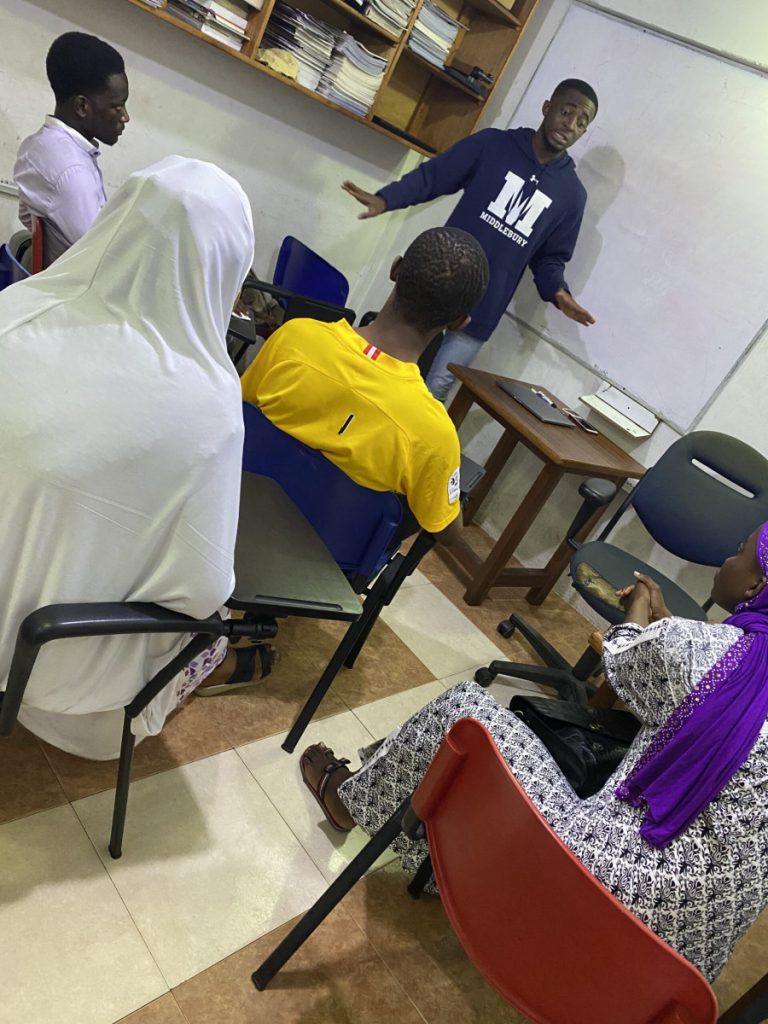The Center for Community Engagement is often sought out by students wishing to deepen their commitments and connections to either communities right here in Middlebury or communities beyond. Students enter our doors with an eclectic mix of ideas for projects aiming to support and bond with communities. To help carry out these ideas, we provide funding and financial support to assist students in reaching their project goals.
Through one of our four main programs, the Cross-Cultural Community Engagement grant, endowed by a Middlebury Class of 1987 alumnus, supports students in their cross-cultural service, advocacy, and activism work. The fund strives to offer students the opportunity to engage in service-learning and community-building experiences aimed at cultural connectedness through internships, volunteer services, and trip projects. With the grant, students are also allowed the chance to self-design their service initiatives. The Center for Community Engagement highly encourages students to apply for funding for their project as the grant is available throughout the academic year as well as over the summer.
This college academic year witnessed many shifts and uncertainty, thereby changing the nature of the Cross-Cultural Community Engagement grant service projects. Yet, regardless of those changes, the core values and purpose of the program was left untouched. Even with limitations set by COVID-19 restrictions, students were able to pursue their projects with adjustments.
This blog highlights a couple of the Cross-Cultural Community Engagement grant projects from J-Term 2021 and shows how each student utilized the funding to engage within a community.
Abdul Abubakri ‘23:
“During the summer of 2020 and as of now, I have partnered with the Nolbed Foundation, a member of the HALI access network, to help students in my community apply to prestigious colleges in the US and around the world. I serve as a mentor and provide such students with guidance and counselling, SAT tutoring, and assistance with college applications. It beams me with a lot of glee to be able to put smiles and hopes on the faces of students like myself, their families and in the long run, helping my community achieve greatness”.
Read the full reflection here.
Mai Thuong ‘22:
“We have been having activities every day from Monday to Friday, at 7:45AM Nepali time, with on-going students, mostly students in 3rd, 4th, and 5th grade. Middlebury students have lead activities such as storytelling, dance, cultural conversations, and yoga. These activities are all optional, but the students keep coming regularly with such a huge enthusiasm, curiosity to learn, and energy to talk. This is a big motivation for us to keep having these activities with the students everyday”.
Smith Gakuya ‘23:
“In January of 2021 we embarked on a journey to the Tanzanian island of Zanzibar (the birthplace of Africa’s most widely spoken indigenous language) for a Swahili immersion project. The project was aimed at acquiring a deeper insight into not only the Swahili language but also learning more about the culture. One key thing I learnt from the entire experience, other than learning a lot more about the people’s history, was that there is an urgent need to bring an end to the neo-colonialism and corruption that plague not only the island but also the African continent as a whole. As a Kenyan I was already versed with one Swahili dialect and a bit of the culture. However, unlike Tanzania, Kenya’s government through various means has demeaned the country’s Swahili heritage. On a wider lens, most curricula around the globe need decolonization. This project was a way of beginning to learn about and collect stories from different African cultures with the aim of documenting through the writing of fictional short stories telling more about the continent and its people. My favorite moment is when we learnt about the spiritual and cultural importance of spices to the islanders. We met a man who went by the nickname “Mr. Butterfly”, who is in the video climbing the palm tree without any equipment to fetch coconuts, which happens to be much harder than it seems. While he did so, he would stop at different levels to sing and tell us the historical importance of singing while doing so.
I would also like to share my sincere gratitude to the CCE for making this cultural exploration possible and I hope to be able to share the short stories with the Middlebury community soon”.
Alexandra Burns ‘21:
I have been working a detention hotline and have been able to speak with people on the inside, provide a friendly voice, and try to help transfer them to legal counseling. Learning how to turn my computer into a mini-call center was initially confusing, but now is totally doable. Having Biden’s inauguration take place in the midst of all of this was a reminder that while there is hope with a new administration, the work on the ground does not stop anytime soon and this is not a moment to become complacent about these issues.
Read the full reflection here.




